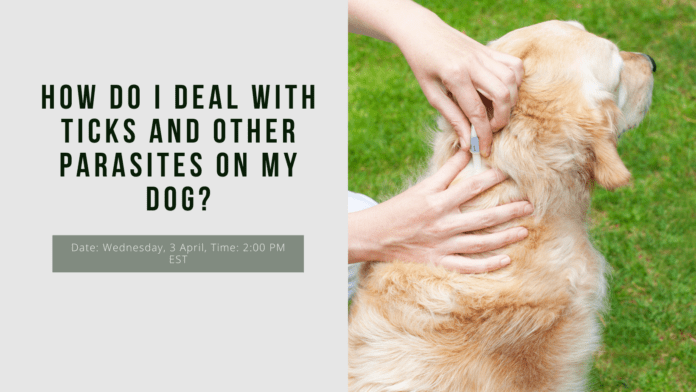Last Updated on May 11, 2024 by Dogs Vets
How Do I Deal With Ticks and Other Parasites on My Dog?
Imagine this: you and your furry best friend are out for a joyous romp in the park. Tails are wagging, tongues are lolling, and life is good.
But lurking unseen in the tall grass or leafy bushes could be tiny hitchhikers waiting to latch onto your unsuspecting pup – parasites. Ticks, fleas, heartworms – the thought of these creepy crawlies invading your dog’s space is enough to send shivers down any pet parent’s spine. Fear not, fellow dog lovers!
This comprehensive guide will equip you with the knowledge and tools to combat these unwelcome guests effectively.
We’ll delve into the identification, prevention, and removal of ticks and other common canine parasites, get rid of parasites with pest control, and ensure your dog stays happy, healthy, and pest-free.
Why Should I Be Concerned About Parasites?
Parasites are organisms that live on or within another organism (their host) and derive nutrients from it. While some may cause minimal discomfort, others can transmit serious diseases to your dog, putting their health at significant risk.
Ticks, for instance, can carry Lyme disease, while fleas can trigger allergic dermatitis, causing intense itching and irritation. Heartworm, a potentially fatal condition affecting the heart and lungs, is transmitted by mosquitos.
By taking proactive measures against parasites, you’re not just safeguarding your dog’s well-being, you’re also ensuring a happier and more comfortable life for them.

Identifying the Enemy: Common Dog Parasites
The first step in winning the war against parasites is knowing your enemy.
Here’s a quick rundown of the most common culprits:
- Ticks: These spider-like creatures attach themselves to your dog’s skin and feed on their blood. They can be as small as a pinhead when unfed, growing larger and rounder as they engorge.
- Fleas: These tiny, jumping insects live on your dog’s fur and feed on their blood. They cause intense itching and irritation, leading to excessive scratching and potential skin infections.
- Heartworms: Transmitted by mosquitos, these parasitic worms live inside your dog’s heart and lungs, eventually causing severe respiratory problems and even death if left untreated.
- Roundworms: These intestinal parasites resemble spaghetti worms and can cause weight loss, diarrhea, and vomiting in dogs.
- Tapeworms: Segmented worms found in your dog’s feces, tapeworms can cause digestive upset and nutrient deficiencies.
Look Out for These Signs: How to Spot a Parasite Infestation
Early detection is crucial for effective parasite control. Here are some telltale signs that your dog might have unwanted guests:
- Scratching: Excessive scratching, particularly at the base of the tail and around the ears, is a common sign of flea infestation.
- Visible Ticks: Carefully examine your dog after walks in grassy areas, paying close attention to their ears, paws, and groin. Ticks appear as small bumps on the skin.
- Weight Loss: Unexplained weight loss, especially coupled with a poor appetite, can indicate intestinal parasites like roundworms or tapeworms.
- Coughing: A persistent cough could be a sign of heartworm infection, especially in older dogs.
- Vomiting or Diarrhea: These symptoms can be caused by various factors, including parasite infestation.
Eliminating ticks & fleas from your home
Removing Ticks: A Step-by-Step Guide
If you find a tick on your dog, it’s important to remove it promptly and safely. Here’s how:
- Gather your tools: You’ll need a pair of fine-tipped tweezers or a tick removal tool.
- Protect yourself: Wear gloves to avoid transferring any diseases the tick might carry.
- Grab the tick: Using your tweezers or tick removal tool, grasp the tick as close to your dog’s skin as possible.
- Pull steadily: With slow, even pressure, pull the tick straight out. Avoid twisting or squeezing, as this can rupture the tick’s body and increase the risk of infection.
- Dispose of the tick properly: Place the removed tick in a sealed container filled with rubbing alcohol to kill it.
- Clean the bite area: Disinfect the bite area on your dog’s skin with a mild antiseptic solution.
Preventing Parasite Infestation: The Best Defense is a Good Offense
The good news is that there are several effective ways to prevent parasites from taking hold in the first place:
- Monthly Parasite Prevention Medication: Talk to your veterinarian about the best parasite prevention medication for your dog. This could be a topical application, a chewable tablet, or a collar.
- Regular Grooming: Brushing your dog regularly helps remove fleas and flea eggs from their fur. It also allows you to inspect their skin for any signs of ticks or other parasites.
- Maintain a Clean Environment: Regularly vacuum your carpets and furniture to remove fleas and flea eggs. Wash your dog’s bedding in hot water to kill any parasites that might be lurking.
- Year-Round Heartworm Prevention: Heartworm infection is a year-round threat, so ensure your dog receives year-round heartworm prevention medication, even during the winter months.

Combating Fleas: A Multi-Pronged Approach
If your dog has contracted fleas, a multi-pronged approach is necessary to eliminate the infestation completely. Here’s what you need to do:
- Treat your dog: Use a veterinarian-recommended flea medication, such as a topical application, chewable tablet, or injection.
- Treat your home: Fleas lay eggs in your carpets, furniture, and bedding. Use a combination of vacuuming, steam cleaning, and pet-safe flea sprays to eliminate fleas and eggs from your home environment.
- Wash your dog’s bedding: Wash all your dog’s bedding, including blankets, toys, and crate liners, in hot water to kill fleas and eggs.
Dealing with Roundworms and Tapeworms
Roundworms and tapeworms are internal parasites that can cause digestive problems in your dog. Treatment typically involves deworming medication prescribed by your veterinarian.
The medication will kill the adult worms present in your dog’s intestines, and follow-up treatments may be necessary to prevent reinfection.
The Heartworm Threat: Early Detection is Crucial
Heartworm infection is a serious health threat for dogs. The good news is that it’s preventable with year-round medication. However, if your dog contracts heartworm disease, early detection and treatment are crucial.
Signs of heartworm infection can include coughing, difficulty breathing, fatigue, and weight loss.
If you suspect your dog might have heartworm disease, your veterinarian will perform a blood test to confirm the diagnosis.
Treatment for heartworm infection is complex and can be expensive. It’s much better to prevent this potentially fatal disease through year-round medication.
Living with an Older Dog: Special Considerations
Older dogs may be more susceptible to parasite infestations due to a weakened immune system. It’s crucial to discuss parasite prevention with your veterinarian and choose appropriate medication for your senior pup.
Regular checkups and early detection of any potential problems are essential for maintaining your older dog’s health and well-being.

Traveling with Your Dog: Parasite Prevention on the Go
If you enjoy traveling with your furry companion, be mindful of parasite risks in different environments. Talk to your veterinarian about any additional parasite prevention measures necessary when traveling to new locations.
The Final Word: Keeping Your Dog Parasite-Free
By understanding the different types of parasites, recognizing the signs of infestation, and implementing effective prevention strategies, you can keep your dog happy, healthy, and pest-free.
Remember, a proactive approach is key. Regular veterinary checkups, parasite prevention medication, and a clean environment are your best weapons in the fight against these unwelcome guests.
Can I get rid of parasites with pest control?
Yes, you can get rid of ticks & fleas from your home. Pest control can be effective in managing parasites in various settings, including livestock like sheep and goats, as well as in human environments.
For example, in sheep and goats, grazing management practices, genetic selection, and medication are used to control internal parasites. In humans, prescription antiparasitic medications like albendazole, ivermectin, mebendazole, and triclabendazole are com
monly used to treat parasitic infections. Additionally, pest control measures, such as using insecticides, can help eliminate parasites like bedbugs in homes. Pest control methods are tailored to the specific type of parasite and the environment in which they are present, ensuring effective parasite management.
How to deal with ticks and other parasites in your home
How to deal with ticks and other parasites in your home there are several effective strategies you can implement based on the information from the sources provided:
- Preventive Measures:
- Maintain a clean environment by regularly cleaning and vacuuming your home to remove flea eggs or larvae.
- Keep outdoor spaces tidy and the grass short to make them less attractive to ticks.
- Regularly groom your pets with flea and tick shampoo and comb them with a flea comb to detect and remove parasites.
- Consider preventive treatments like oral medications, spot-on treatments, and flea and tick collars for your pets.
- Treatment Methods:
- Use preventive treatments as the first line of defense against parasites in pets, such as oral medications, spot-on treatments, and flea and tick collars.
- Consider using insect growth regulators (IGRs) to interfere with the growth and development of parasites, preventing them from reproducing.
- In severe infestations, treat the environment with foggers or sprays to eliminate parasites in the home and yard.
- Tick Removal:
- If you find ticks on pets or people, remove them cautiously and thoroughly. Use tweezers to grasp them behind the head and pull them slowly away from the host.
- Take a shower soon after being outdoors to reduce the risk of tick bites and Lyme disease.
- Environmental Control:
- If necessary, consider treating your yard with pesticides specifically designed to control ticks to further prevent infestations.
By combining these preventive measures, treatment methods, tick removal techniques, and environmental control strategies, you can effectively manage and eliminate ticks and other parasites in your home and protect both your pets and family from potential health risks.
Frequently Asked Questions (FAQs)
Can I use home remedies to remove ticks from my dog?
While some home remedies exist for tick removal, they’re not always effective and can even be dangerous. It’s best to use the safe and recommended method of removing ticks with tweezers or a tick removal tool.
How often should I bathe my dog to prevent fleas?
Frequent baths alone are not sufficient for flea prevention. You should use a veterinarian-recommended flea medication alongside regular bathing to effectively control a flea infestation.
Can humans contract fleas from their dogs?
Yes, fleas can bite humans, but they typically don’t establish long-term infestations on humans. Flea bites can cause itchy red bumps that usually disappear within a few days.
What happens if I leave a heartworm infection untreated?
Untreated heartworm infection can be fatal. The worms can grow and damage the heart, lungs, and other organs. Early detection and treatment are crucial for a successful outcome.
Are there any side effects to parasite prevention medication?
As with any medication, there’s a slight possibility of side effects with parasite prevention medication. However, these are usually mild and can be discussed with your veterinarian.
Verified Source References:
- American Veterinary Medical Association: https://www.avma.org/ – Parasite Prevention Guidelines
- Centers for Disease Control and Prevention: https://www.cdc.gov/) – Heartworm Infection in Dogs

















